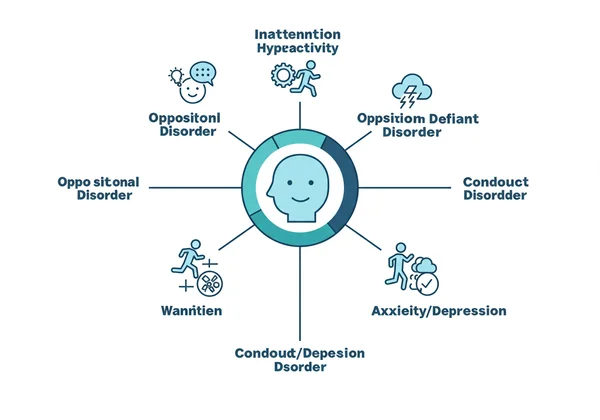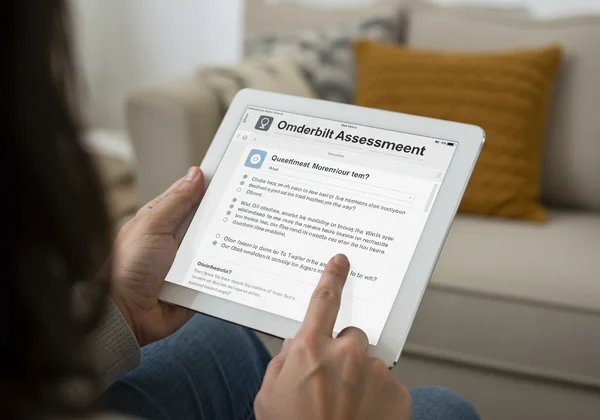¿Qué es la evaluación Vanderbilt? Una guía de detección del TDAH
Has notado que tu hijo tiene dificultades para concentrarse, hiperactividad o problemas de comportamiento en el aula, y te preguntas qué significa y qué hacer a continuación. No estás solo. El camino para comprender las necesidades únicas de un niño puede parecer abrumador, pero existen herramientas confiables para iluminar el camino. La evaluación Vanderbilt es un primer paso vital para millones de padres y educadores que buscan claridad. Entonces, ¿qué es la evaluación Vanderbilt? En esta guía, exploraremos qué es la evaluación Vanderbilt, qué mide y cómo puedes utilizar una herramienta de detección en línea accesible para comprender mejor a tu hijo.

Entendiendo la Escala de Evaluación Vanderbilt
La Escala de Evaluación Vanderbilt de NICHQ es más que un simple cuestionario; es un instrumento diseñado meticulosamente y ampliamente respetado para la detección del Trastorno por Déficit de Atención con Hiperactividad (TDAH) en niños en edad escolar. Proporciona una forma estructurada de recopilar y evaluar información sobre el comportamiento de un niño de las personas que mejor lo conocen: sus padres y maestros. Al traducir las observaciones en datos estandarizados, crea un lenguaje común para que padres, educadores y clínicos discutan los desafíos y fortalezas de un niño.
El Estándar de Oro para la Detección del TDAH
Cuando utilizas la Evaluación Vanderbilt, estás utilizando una herramienta con gran credibilidad. Desarrollada por el Instituto Nacional para la Calidad de la Salud Infantil (NICHQ), también está respaldada y recomendada por la Academia Americana de Pediatría (AAP). Esto no es solo un cuestionario en línea al azar; es un método de detección de grado profesional utilizado en clínicas y escuelas de todo el mundo. Su autoridad proviene de su capacidad, respaldada por la investigación, para identificar síntomas asociados con el TDAH, ayudando a señalar a los niños que podrían beneficiarse de una evaluación clínica formal. Esta Escala de Evaluación Vanderbilt de NICHQ es el punto de referencia para las consultas iniciales sobre el TDAH.
Formularios para Padres vs. Maestros: Diferencias Clave
El comportamiento de un niño puede variar significativamente entre diferentes entornos. Podría ser capaz de concentrarse en una actividad preferida en casa, pero tener dificultades para quedarse quieto durante una lección de matemáticas. Para capturar esta imagen completa, el sistema Vanderbilt incluye dos versiones distintas: el Formulario de Evaluación Vanderbilt para Padres y el Formulario de Evaluación Vanderbilt para Maestros.
- Formulario para Padres: Esta versión pide a los cuidadores que califiquen los comportamientos observados en el hogar y en entornos sociales. Proporciona una visión crucial de cómo funciona un niño dentro de la familia, cómo completa las tareas y cómo interactúa con sus compañeros fuera de la escuela.
- Formulario para Maestros: Este cuestionario se centra en el entorno académico. Recopila la perspectiva de un maestro sobre la atención del estudiante en clase, la capacidad para seguir instrucciones, la impulsividad durante las lecciones y las interacciones con los compañeros de clase.
El uso de ambos formularios proporciona una vista de 360 grados, lo cual es esencial para una comprensión integral. Las diferencias en las puntuaciones entre ambos pueden ser increíblemente informativas, destacando entornos específicos donde un niño podría necesitar más apoyo.
¿Qué Mide la Evaluación Vanderbilt para el TDAH?
Lo que hace que la Evaluación Vanderbilt para el TDAH sea tan efectiva es su alcance integral. Si bien su función principal es detectar el TDAH, sus preguntas están diseñadas para detectar síntomas de otros desafíos conductuales y emocionales comunes que a menudo se presentan junto con el TDAH. Esto permite una visión más holística del bienestar de un niño.

Síntomas Centrales del TDAH: Inatención e Hiperactividad
La evaluación se basa en los criterios diagnósticos centrales para el TDAH, tal como se describen en el DSM (Manual Diagnóstico y Estadístico de los Trastornos Mentales). Las preguntas se dividen en dos categorías principales de síntomas:
- Inatención: Esta sección investiga comportamientos como cometer errores por descuido, tener problemas para mantener la atención en las tareas, no parecer escuchar cuando se le habla directamente, no terminar los trabajos escolares o las tareas del hogar, y distraerse o olvidar fácilmente.
- Hiperactividad/Impulsividad: Estas preguntas abordan síntomas como inquietud, levantarse del asiento cuando se espera que permanezca sentado, correr o trepar en situaciones inapropiadas, ser incapaz de jugar en silencio, hablar en exceso e interrumpir a los demás.
Una evaluación Vanderbilt para niños fácil de usar ayuda a cuantificar la frecuencia y la gravedad de estos comportamientos específicos, yendo más allá de la vaga sensación de que "algo anda mal" para identificar áreas específicas de preocupación.
Más allá del TDAH: Detección de Condiciones Coexistentes
Los niños con TDAH rara vez lo experimentan de forma aislada. La Evaluación Vanderbilt incluye cuidadosamente secciones para detectar otros desafíos comunes, a menudo llamados condiciones coexistentes o comórbidas. Nuestra plataforma asegura que estas áreas también sean evaluadas, brindándote una imagen más completa. Estas incluyen:
- Trastorno Oposicionista Desafiante (TOD): Preguntas dirigidas a patrones de estado de ánimo irritable/enojado, comportamiento argumentativo/desafiante y rencor.
- Trastorno de Conducta (TC): Preguntas para detectar comportamientos más graves que violan los derechos de los demás o las normas sociales importantes, como agresión, destrucción de la propiedad o engaño.
- Ansiedad y Depresión: Esta sección busca signos de preocupación excesiva, miedo, tristeza y pérdida de interés, que a menudo pueden imitar o empeorar los síntomas del TDAH.
Al detectar estas condiciones simultáneamente, la evaluación ayuda a garantizar que no se pase por alto un posible problema subyacente. Esto es crucial para guiar los siguientes pasos y las discusiones con un profesional de la salud.
Cómo Usar Nuestra Herramienta de Evaluación Vanderbilt en Línea
Comprender la escala es el primer paso, pero ponerla en práctica es lo que aporta una verdadera visión. Atrás quedaron los días de imprimir PDFs y puntuar manualmente. La evaluación Vanderbilt en línea revoluciona este proceso, haciéndolo simple, privado y potente. Nuestra plataforma está diseñada para guiarte a través de este proceso con facilidad y brindarte resultados inmediatos y comprensibles.
Un Proceso Simple, Confidencial e Instantáneo
Creemos que buscar información sobre tu hijo debe ser sencillo y sin estrés. Nuestro proceso está diseñado para padres y maestros ocupados. Simplemente respondes el cuestionario estandarizado en línea, un proceso que suele tardar entre 10 y 15 minutos. No hay una confusa guía de puntuación de la escala Vanderbilt para el TDAH que descifrar; nuestro sistema calcula las puntuaciones de forma instantánea y automática de acuerdo con las pautas oficiales de NICHQ. Tus resultados son confidenciales y se presentan en un informe estándar claro y fácil de leer. Puedes realizar la evaluación gratuita en cualquier momento, desde cualquier dispositivo.

Interpretando tus Resultados: De Puntuaciones Estándar a Perspectivas de IA
Recibir un informe de puntuación estándar es útil, pero ¿qué significa realmente para la vida diaria de tu hijo? Aquí es donde nuestra plataforma ofrece una ventaja única y poderosa. Si bien el informe estándar te da los números, tienes la opción de desbloquear un Informe Personalizado basado en IA. Al proporcionar contexto adicional sobre tu hijo, nuestra IA analiza los datos para ofrecer perspectivas más profundas, que incluyen:
- Escenarios Personalizados: Cómo estos comportamientos podrían manifestarse en situaciones de la vida real en casa o en la escuela.
- Análisis de Fortalezas y Desafíos: Identificando no solo las dificultades, sino también las posibles fortalezas de tu hijo.
- Orientación Accionable: Pasos concretos y de apoyo para discutir con profesionales e implementar en casa.
Este análisis mejorado por IA transforma una simple puntuación en una guía práctica, empoderándote con conocimiento. Puedes descubrir tus resultados y obtener un nuevo nivel de comprensión.
La Evaluación Vanderbilt es una herramienta de detección poderosa, autorizada y accesible que sirve como un primer paso invaluable para cualquier padre o educador preocupado por el comportamiento de un niño. Reemplaza la incertidumbre con información estructurada, proporcionando una base sólida para conversaciones productivas con médicos, psicólogos y personal de apoyo escolar. Recuerda, este es un instrumento de detección, no un diagnóstico final. Su propósito es iluminar posibles áreas de preocupación y empoderarte para buscar la orientación profesional adecuada.
¿Listo para obtener una comprensión más clara del comportamiento de tu hijo? Tu viaje hacia la claridad y el apoyo comienza aquí. Realiza nuestra Evaluación Vanderbilt gratuita y confidencial en línea ahora y recibe tus resultados al instante.
Preguntas Frecuentes sobre la Evaluación Vanderbilt
¿Qué tan precisa es la evaluación Vanderbilt en la detección del TDAH?
La Evaluación Vanderbilt se considera una herramienta de detección altamente confiable y válida cuando se usa correctamente. Su precisión proviene de ser estandarizada y desarrollada con base en la investigación clínica. Sin embargo, su precisión depende de respuestas honestas y reflexivas del padre o maestro. Es importante recordar que es una herramienta de detección que identifica niños en riesgo, no una prueba de diagnóstico. Un diagnóstico formal solo puede ser realizado por un profesional de la salud calificado.
¿Qué significa una puntuación alta en la evaluación Vanderbilt?
Una puntuación alta en una o más áreas sugiere que un niño está exhibiendo un número significativo de síntomas asociados con el TDAH u otra condición conductual. Esta puntuación indica que es muy recomendable una conversación de seguimiento con un pediatra, psicólogo infantil u otro profesional clínico. No significa automáticamente que tu hijo tenga un trastorno. Es un punto de datos que indica que se justifica una evaluación adicional para comprender el contexto completo. Puedes usar nuestra evaluación confidencial para obtener una comprensión inicial.
¿Se puede usar la Evaluación Vanderbilt para adultos?
No, la Escala de Evaluación Vanderbilt de NICHQ fue diseñada, estandarizada y validada específicamente para niños de 6 a 12 años. Usarla para adultos o incluso adolescentes mayores no produciría resultados confiables o válidos, ya que los criterios de comportamiento y las normas son diferentes para diferentes grupos de edad. Existen otras herramientas de evaluación, como la Escala de Autoinforme para el TDAH en Adultos (ASRS), que están diseñadas específicamente para evaluar el TDAH en adultos.